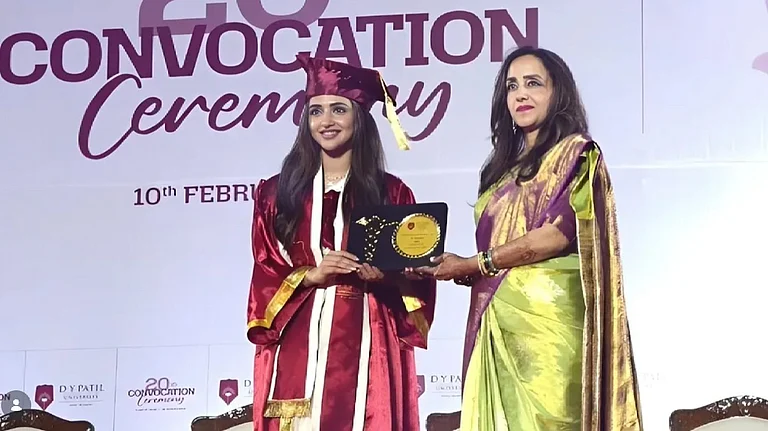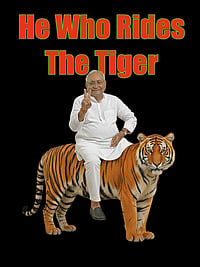Every year, we say we won’t go this time. It’s a jamboree, nothing literary about it, where is the quiet moment. Yet when the time comes, we are all on the Ajmer Shatabdi, on NH 8, on that 40-minute flight. That is only the Delhi gang, not counting the thousands pouring in from Guwahati to Guntur. And now the Jaipur Literature Festival, JLF, is ten. In 2004 when it was still Jaipur Virasat Festival, there were 16 people in Durbar Hall, the smallest venue at Diggi Palace, 12 of them Japanese tourists who had accidentally strayed in. Till about 2008-09 it was a bit like that—a few hundred people, somewhat bewildered, gathering to listen to a few authors, equally flummoxed.
But after that it all changed as the buzz about it became big. Slumdog Millionaire swept the Oscars in 2008 and sessions with the many people associated with the film, like author Vikas Swarup on whose book Q and A the film was based, drew huge crowds. “I have to say, a four-page spread in Outlook about JLF around that time was also a big booster. It got the serious readers and writers to take note of it,” says William Dalrymple, co-director who has been with the festival from the start. He says soon many international authors would block their dates for the festival. “So far, nobody has said no to JLF. Except Amitav Ghosh,” he chuckles.
This year there are 279 writers and speakers, from A.N. Wilson to Vaasanthi, and there are sure to be enough visitors to hold the elegant Diggi Palace, the festival’s venue since the beginning, under siege for five days. At first glance, this year’s line-up may seem somewhat low on star dazzle—of course, there are this year’s Booker winner Paul Beatty, two years ago winner Richard Flanagan, 2004 winner Alan Hollinghurst, there is The Crying Game maker Neil Jordan, the cult comedy Whitnail and I director Bruce Robinson, Mei Fong author of One Child, Indonesian bestselling writer Eka Kurniawan of Beauty is a Wound, John Keay, Anne Waldman, Nassim Nicholas Taleb, Vikram Chandra, Sunil Khilnani, Gulzar, Tishani Doshi, Rishi Kapoor. But even the very first edition of JLF had literary superstars like Salman Rushdie, Ian McEwan and Hari Kunzru. Then there have been J.M. Coetzee, Orhan Pamuk, Jhumpa Lahiri, Margret Atwood, Jonathan Franzen. But this perhaps is a sign of JLF growing up too—it doesn’t need the star power anymore to attract crowds.
The theme this year is India at 70. “There will be a copy of the 1215 AD Magna Carta on loan from the British Library on display. There are also a lot of discussions on art, women, poetry, travel, economy, translations and world literature. Thematically, the festival will reflect the current environment in India and the world,” says Sanjoy Roy of Teamwork, who has produced the JFL from its first installment.
The various sessions, as always, are eclectic. On opening day Paul Beatty will be discussing his tour de force, The Sellout, with Meru Gokhale, there is a session on Jayalalitha with her biographer Vaasanthi; Sadhguru will extol us to reengineer ourselves to find joy, a discussion titled Murder, Madness and Oxford English Dictionary with Simon Winchester and Jonathan Shainin sounds fun, another one is with Kannada writer (and U.R. Ananthamurthy’s bête noir) S.L. Bhyrappa interestingly with Vivek Shanbag, author and URA’s son-in-law.
The next day Gulzar Sahab will enthrall the audience with his new collection Suspected Poetry, a despairing ode to the times we live in, so will Rishi Kapoor with his autobiography, Main Shayar Toh Nahi; Novelists Manu Joseph and Karan Mahajan will talk about writing in our times; Linda Colley’s defining work Captives, about Britons captured in their colonies in Africa and Asia in the various wars will be detailed by historian Sunil Khilnani.
Saturday will start with a debate whether the book is mightier than the screen between writers Alan Holinghurst, Richard Flagnan, filmmaker Neil Jordan and playwright David Hare, later a session with two Caribbean poets Ishion Hutchinson and Vladimir Lucien promises to be interesting, so does the one titled Brexit with British writer A.N.Wilson, war historian Andrew Roberts, Linda Colley and others. Shashi Tharoor, Jon Wilson, whose India Conquered just came out, and John Keay of the celebrated India book will discuss how the East India Company took over India through dubious methods, the weekend also has a lot of discussion on poetry and wildlife. Sunday has an interesting session titled Jack the Ripper: An Establishment Cover Up with Bruce Robinson and A.N. Wilson; another riveting one is called What Cannot Be Said where Hyeonseo Lee, the North Korean writer who defected to Seoul and whose memoir, The Girl With Seven Names, became an instant bestseller, and Kanak Mani Dixit whose newspaper Himal recently shut down in Nepal, will be in conversation with veteran journalist Madhu Trehan, who now runs the portal NewsLaundry.
The last day has a topical subject, Indian Films and the National Narrative between Imtiaz Ali (Jab We Met, Rockstar, Highway etc), Sudhir Mishra (Is Raat Ki Subah Nahin, Hazaar Khwaishein Aise), the omnipresent Javed Akhthar and film critic Shubhra Gupta; and a discussion with Neil MacGregor, British Museum director and author of the fascinating A History of the World in 100 Objects with theatre director Tim Supple, though the topic is MacGregor’s later book, Shakespeare in the Restless World. Monday also has writer Samanth Subramaniam talking to Luke Harding, author of The Snowden Files: The Inside Story of the World’s Most Wanted Man as well as an introduction of the redoubtable ‘tree-man’ Pradip Kishen by writer and conservationist Arefa Tehsin.
Now, which one of these sessions has the potential to make headlines? Well, it could be any. After all, it was a tranquil afternoon three years ago when everyone was shaken off from their stupor by sociologist Ashis Nandy’s remarks on Dalits, tribals and OBCs, which he said were misconstrued. Before that it was the drama over Salman Rushdie—will he, won’t he come to the festival, which ended when he didn’t finally. “There is a volatile mix of great writers, passionate audience and media presence. Every innocuous subject can be potentially controversial. We take them in our stride as long as the discourse within the festival remains civil,” says Namita Gokhale, co-director of JLF who too has been with it from the start. “It’s not as if we manufacture these controversies,” adds Dalrymple. “There are 750 journalists at the JLF every year. Out of that only a handful are literary journalists, the others are news people who have to file stories for their papers or TV channels, which is not the case with other literature festivals. So, there may be a fantastic discussion going on between Noble laureates but what gets picked up is what someone said to another at the bar,” he says.
Last year there were over three lakh visitors at Diggi Palace. Isn’t it time to look at a larger venue? There has been a lot of discussion internally on this and a way out may be to keep the strictly literary discussions at Diggi and move the more populist speakers, like say an Oprah Winfrey or Rahul Dravid or Dalai Lama who attract hordes of fans, to a nearby place. Next year there could well be two venues of the JLF.
We will be coming up with all the news, views, interviews, profiles, and most certainly what goes on at the bar, in this space. Do bookmark it.



























